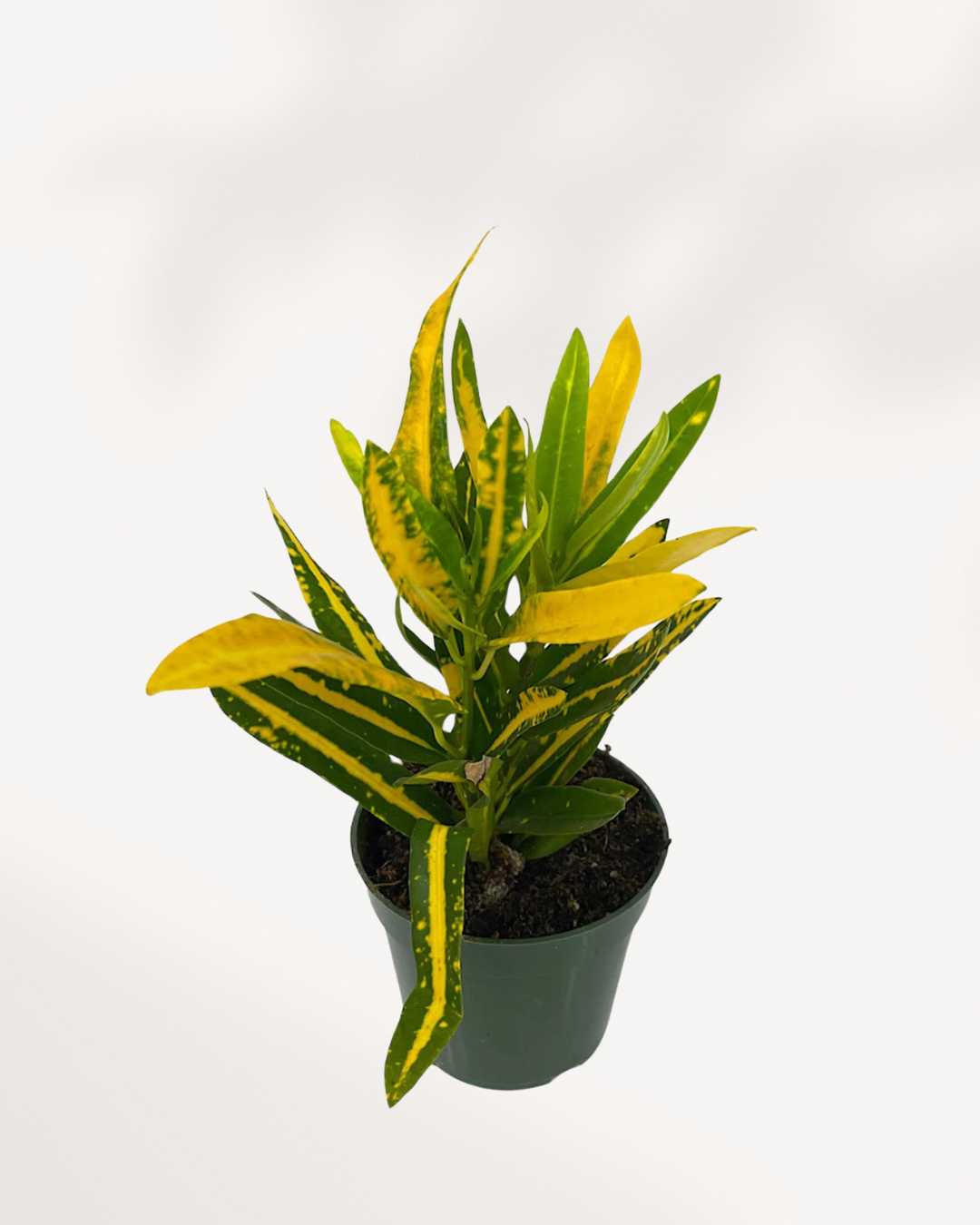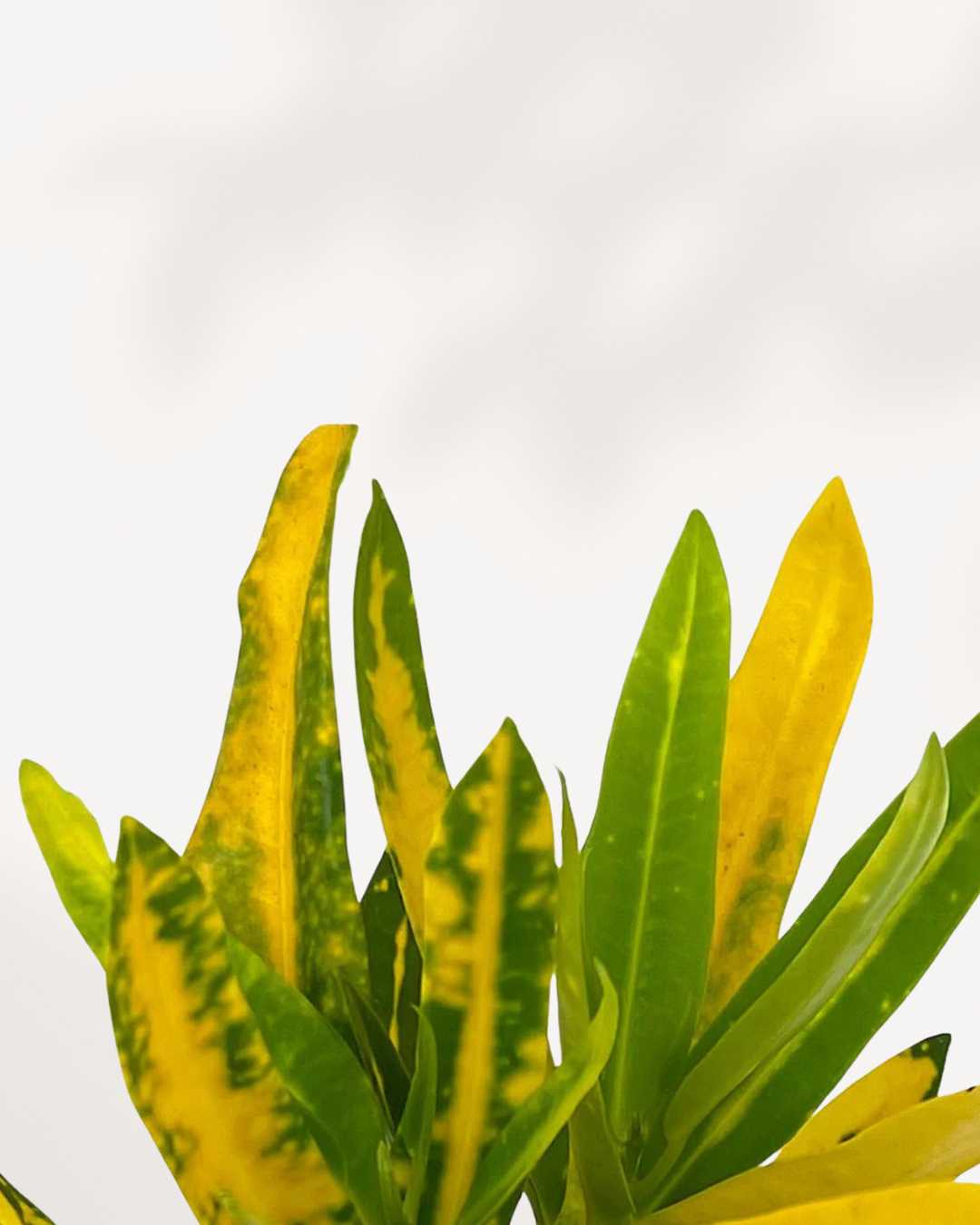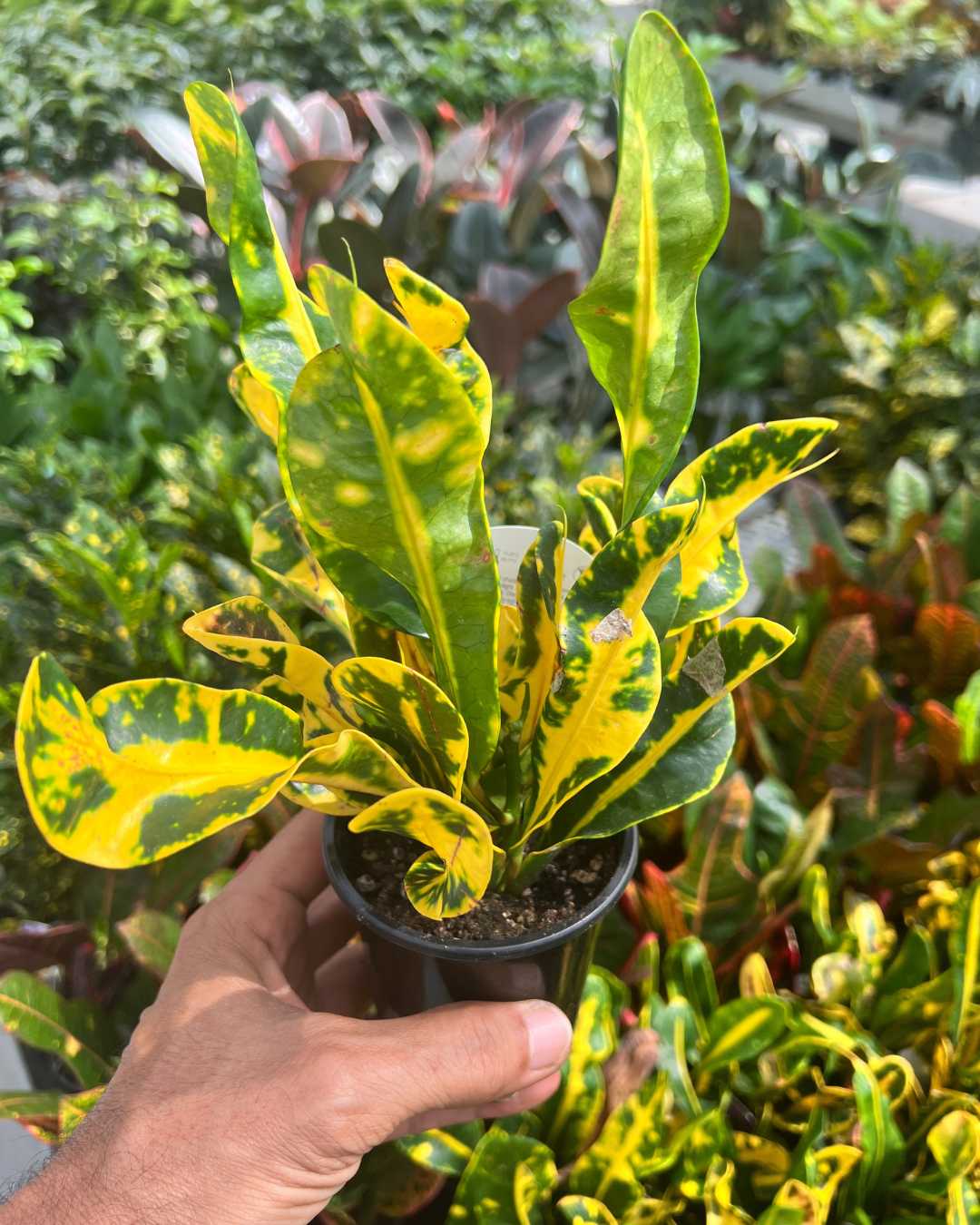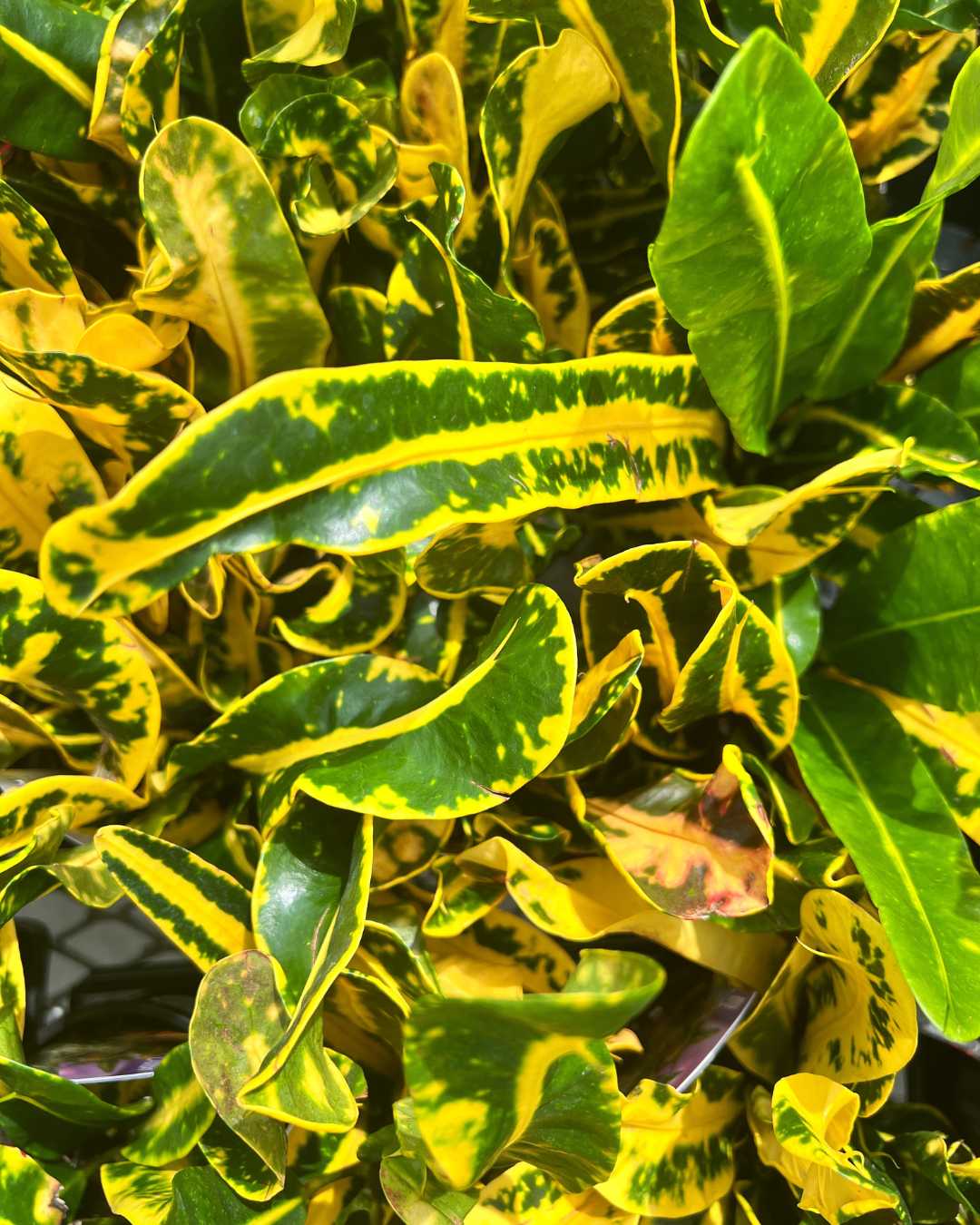Couldn't load pickup availability
Croton Sunshine – A Burst of Sunlight in Your Space
Brighten up your home with Croton Sunshine, a vibrant tropical plant known for its radiant, bright yellow leaves. This dynamic croton infuses any room with a sunny touch, making it perfect for adding energy and warmth to your indoor décor. Ideal for both plant enthusiasts and beginners, Croton Sunshine is celebrated for its easy care and striking visual appeal.
Why You'll Love Croton Sunshine
- ☀️ Radiant, bright yellow foliage that instantly enlivens any space
- 🌿 Easy-to-care-for tropical plant perfect for indoor environments
- 💧 Thrives with minimal watering and bright, indirect light
- 🌱 Enhances air quality while adding a touch of exotic charm
Common Names
- Croton Sunshine
- Sunshine Croton
- Tropical Croton
Botanical Classification
- Kingdom: Plantae
- Order: Malpighiales
- Family: Euphorbiaceae
- Genus: Codiaeum
- Species: Codiaeum variegatum (cultivar: Sunshine)
Native Habitat
Crotons are native to tropical regions, thriving in warm, humid environments. Croton Sunshine is particularly suited for indoor conditions, where its vivid hues and robust nature can shine.
Historical and Cultural Significance
With a rich history in tropical horticulture, crotons have long been valued for their dramatic foliage and vibrant colors. Croton Sunshine brings a modern twist to this classic plant, symbolizing energy and vitality.
Why It’s So Popular
- Creates a lively, tropical atmosphere in any room
- Perfect for both indoor décor and as a statement garden plant
- Easy maintenance makes it ideal for busy lifestyles
- Improves indoor air quality while adding a splash of color
What Does It Look Like?
Appearance
Croton Sunshine features bright, sunny yellow leaves with intricate variegation patterns that create a dynamic, eye-catching display. The glossy foliage radiates warmth and adds a cheerful accent to any space.
Growth Habit
This croton grows in an upright manner with a bushy form, making it an excellent focal point. Its dense, vibrant foliage is perfect for brightening up any indoor setting.
Popular Croton Varieties
Petra Croton
- Features broad leaves with bold red, yellow, and green veins.
Croton Banana
- Known for its long, banana-shaped leaves in vibrant yellow and green hues.
Croton Excellente
- Characterized by its deeply lobed leaves with a mix of red, yellow, and green colors.
Croton Magnificent
- Bold leaves with green, yellow, and orange speckles.
Croton Gold Dust
- Speckled yellow spots on a green background.
Common Pests
Spider Mites
Spider mites can cause stippling and fine webbing on the leaves. Increase humidity and treat with insecticidal soap or neem oil. Learn More
Mealybugs
Mealybugs leave white, cotton-like deposits on the leaves. They can be managed with rubbing alcohol or insecticidal soap. Learn More
Frequently Asked Questions
How much light does Croton Sunshine need?
It thrives in bright, indirect light but can tolerate moderate levels. Too much direct sunlight may scorch the leaves.
How often should I water Croton Sunshine?
Water when the top inch of soil is dry—typically every 1-2 weeks, depending on indoor humidity and temperature.
Can Croton Sunshine be grown indoors?
Yes, Croton Sunshine is well-suited for indoor environments, providing a burst of color and energy.
How do I propagate Croton Sunshine?
Propagation is commonly done via stem cuttings. Place cuttings in water or moist soil until roots develop, then transplant.
Learn More About Croton Plant Care
For detailed care instructions and tips on maintaining vibrant croton plants, visit our Croton Plant Care Guide.
Ready to Bring a Burst of Sunlight Home?
Add Croton Sunshine to your collection today and enjoy its vibrant, sunny appeal that transforms any space.
Order Yours NowHow to take care of Croton Sunshine
Sun: Direct - Indirect
Sun: Direct - Indirect
Light: Medium - Bright
Light: Medium - Bright
Water: When top quarter dry
Water: When top quarter dry
Humidity: Any
Humidity: Any
Pet Friendly: Caution
Pet Friendly: Caution
Pro Tip
Pro Tip
Delivery Policy for Plant Condition
Delivery Policy for Plant Condition
"I have only received part of my order. What to do?
No worries if you've only got part of your order! Our plants come from different nurseries and might arrive in separate shipments, typically 1-2 days apart. It's all part of ensuring your green friends reach you in top-notch condition!
If you do not receive the remaining packages within 48 hours contact support at info@mygreenscape.ca
What is the Life Time Support?
Absolutely! Lifetime support means you can count on us whenever you have questions or uncertainties about your plant. Whether you're puzzled by its behavior or just want to ensure it's thriving, we're here for you. Connect with us on Instagram @mygreenscapeto or shoot us an email at support@mygreenscape.ca.
When it comes to our guarantee for plants shipped with standard or express, rest assured that we offer a 30-day happy healthy plant guarantee on all such shipments. This ensures that your plants are covered for 30 days after delivery, giving you peace of mind regarding their condition. If you have any concerns within this period, feel free to reach out to us for assistance.
For further details, please visit our Local Delivery, Store Pickup, Standard Shipping Guide Page.
What to expect
What to expect
Your plant will arrive in a standard nursery pot, typically 0.5" - 1" smaller than the stated size to seamlessly fit into your chosen decorative pot. Washable Paper Planter Bags are available for separate purchase.
Just like nature intended, each plant is unique, showcasing natural variations in size, shape, and characteristics. Our commitment is to deliver a plant that closely resembles the one featured on our website, matching your chosen size, and with the potential to thrive happily in your home.
Frequently Asked Questions
Frequently Asked Questions
Certainly! If you're pondering about ordering plants online, you're not alone. We've compiled the most frequently asked questions. Check out our FAQ section here for quick answers! Happy planting!
Plant & Pot Size Chart
Plant & Pot Size Chart
Choosing the right pot size for your plants can be a daunting task, especially if you're new to gardening. But fear not! Our pot sizes chart can help you find the perfect match for your plants, ensuring they have enough space to grow and thrive. With our guide, you'll be able to confidently choose the right pot size and plant variety for your gardening needs.
Plant Pot Size Guide.

| Extra Small | 7-10 cm | 2.5 - 3 inches |
| Small | 11-12 cm | 3.5 - 4 inches |
| Medium | 14-17 cm | 5 - 6 inches |
| Large | 19-21 cm | 8 - 10 inches |
| Extra Large | 24-27 cm | 12 - 14 inches |
All sizes are specified in product details.
Your Complete Guide to Pot Sizes: What Size Should You Choose?

When selecting a pot for your plant, it's important to find the right size. But with all the different options out there, how do you know which one is best? We're here to help!
MyGreenscape's pot sizes chart is a great resource for finding your perfect fit. Our easy-to-read chart takes out all the guesswork and helps you quickly choose the right size for your plant.
Smaller pots are best for seedlings or small plants just starting out. These tend to be shallow but wide, allowing enough room for the roots of the young plant but not too much where they get overcrowded. Medium-sized pots are ideal when your plant has grown from its infancy and is ready for more space. These are deeper and wider than small pots, so that it can accommodate larger root systems - making sure your plant gets enough nourishment while still giving it breathing room. Large pots are top choice if you have an established plant in need of lots of space - think trees and large shrubs! The spacious depth and width allow plenty of room for deep root systems without struggling for air or light.
No matter what size you choose, MyGreenscape has got you covered, with our pot sizes chart guaranteeing you find the perfect fit every time!
Winter Shipping Protection
Winter Shipping Protection
We take extra care with each package during the colder months. For destinations experiencing cold weather, we provide insulated packaging and heat packs as needed to protect your plants from freezing temperatures. With Winter Shipping Protection, your plants are equipped to arrive safe and sound, even in winter’s chill.
Care Guide
Care Guide
Explore essential care tips. check out our Comprehensive Resource for Indoor Plant Care.




WATERING MADE EASY
Check soil moisture before watering and use a potting mix that drains well. It’s the secret to healthy, happy plants!
Hear From Happy Plant Parents.
Who have brought Mygreenscape plants into their homes.









